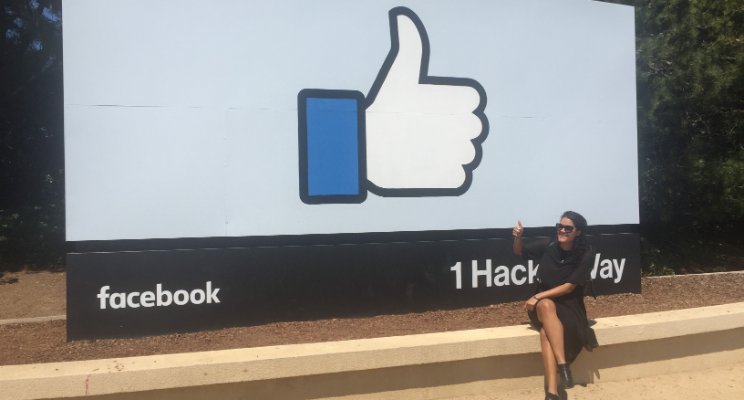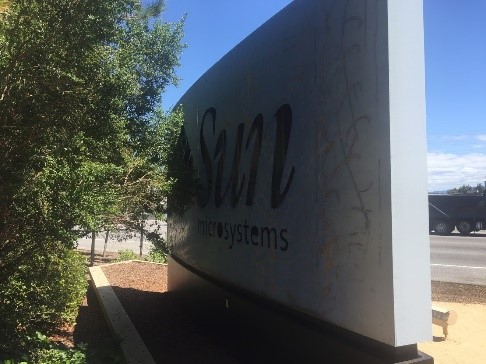
Why Facebook HQ is so much more than free ice-cream
In this cross posting from the LinkedIn agency influencer series Danielle Le Toullec takes a look at how Facebook has helped shape its global philosophy with a few home comforts at HQ.
Earlier this month, I visited one of the most talked about company headquarters in the world.
Back in January, OMD launched its biggest ever training program, OMD Accelerate. To kick things off, we were tasked with a live client business challenge, with the chance of winning a trip to Facebook HQ in Silicon Valley for their Agency Accelerator Program. I was over the moon to be announced as one of the winners and was rewarded with a 3-day immersion with some of the brightest digital minds from around the world. It was a jam-packed few days filled with inspiration, networking, campus tours, Oculus demos and feedback sessions with Facebook product teams.
I feel very fortunate to have had this opportunity, so wanted to share a few key things I took away from my experience:
1. Culture is paramount & scaling it isn’t easy
Facebook has gone to considerable lengths to maintain their start-up mentality, despite growing to almost 20,000 employees globally. Although their campus was designed by consultants from Disneyland, it is more for organisational flow facilitating spontaneous meetings and overall comfort of employees. It’s all exposed concrete and open working spaces with surprisingly little Facebook signage. They still have Q&A each Friday for an hour with Zuckerberg or Sheryl Sandberg and their culture is built around truly making employees lives easier, rather than just bells and whistles for the sake of it.
It’s no secret that Facebook is abundant with free food (yes, there are multiple restaurants on campus where you don’t pay for a thing. Yes, there is an ice-cream parlour. And yes, I overindulged and everything was delicious), as well as countless other benefits and perks – health insurance, barber, bank, free-standing library pods, drycleaners, shuttle bus services, gym, $250 of free Facebook ad spend to use each month on whatever the employee chooses, just to name a few! Above and beyond though, as Kevin Systrom, Instagram CEO and Facebook board member states: “Smart people generally want to work with other smart people on hard problems”.
Facebook has successfully created an environment where their employees are empowered to own their culture. This is prevalent in their values, which are hung on posters all around campus – ‘move fast’, ‘focus on impact’, ‘be open’, ‘build social value’ and ‘be bold’. These signs are made in the ‘Analogue Lab’ and came from people in the organisation, rather than HR. Facebook are single-minded about their mission of making the world a more open, connected place and everything they do ladders back to that.
2. Innovate or be left behind.
There is a reason that Facebook remains the most popular social networking site, with 80% of AU internet users on the platform and 44% on Instagram (Nielsen Digital Content Ratings, March 2017). The hacker mentality is instilled in all employees, regardless of whether they are an engineer or product manager. It’s defined as “An approach to problem solving that is both humble and optimistic in its conviction that anything that has been built… can be improved”.
When explaining their Hacker Culture, Rajan Dev (Global Agency, Strategy Lead) told us about a powerful, hidden message behind the famous 1 Hacker Way Facebook sign you see below. Facebook’s sprawling campus was previously owned by software company Sun Microsystems. Rather than replacing the sign when they moved in, Zuckerberg decided to flip it around. This serves as a constant reminder to stay motivated and to innovate, which is ingrained in the Facebook DNA and mission. The message is clear – being on top doesn’t mean you can take your eye off the ball and the sign is concrete proof of what happens if you do.
3. To truly measure the impact of social, we need to shift the way we measure results.
Beyond culture and innovation, there was a considerable focus on measurement and the implications on how we plan, buy and evaluate media. ROI is a hot topic of conversation in the industry right now. We’ve moved away from vanity metrics and are increasingly focusing on Direct Response objectives. Nicolas Arrivé (Marketing Science, Agency Measurement), pointed out that we’re using outdated technology to measure digital media. He outlined how siloed measurement of TV, desktop, mobile and in-app leads to missed results as there is no common denominator or connection between channels for measurement.
Arrivé suggested three methods to address this:
Focus on people: Shift from cookies and siloed reporting to cross-channel people reach and ROI
Metrics that matter: Shift from clicks and engagement to brand lift, sales, ROI
Compare across everything: Shift from last click attribution to omni-channel multi-touch attribution
Overall, a key thing to remember is that clicks don’t directly equate to sales. Facebook Marketing Science teams have found that clicky users are 4.9 times more expensive than the 50% of users that are least clicky. There is also no significant correlation between CTR and any Nielsen Brand Effect Metrics. In layman’s term, the less clicky users are more cost effective. We need to focus more on how media spend impacts brand and sales objectives both on and off Facebook. For example, asking questions like: Am I reaching real people? Are they the right people? Did my ads reach unique people across devices? Did we generate awareness of a new product? Were the ads memorable?
From its humble roots in a Harvard dorm room, I’m still in awe of just how massive Facebook has become. It has fundamentally changed the way marketers engage consumers and in a broader sense, how humans interact with each other, with studies showing that it is even rewiring our brains. While yes, the perks are nice, it is really the clarity in their purpose that drives Facebook’s ongoing success. Passion without action is just an emotion.
They’ve managed to stay hungry whilst also creating an environment where their people have the space, passion and drive to disrupt. It’s not news that the future is social, but now more than ever, I’m excited to see how Facebook are going to continue evolving!
Danielle Le Toullec is senior social manager at OMD Australia
This piece is part of the LinkedIn Agency Influencer program 2017. See more from the program by clicking the banner below.






